 Windmill at Heemstede on July 23, 2014 Windmill at Heemstede on July 23, 2014 July 23, 2014 Today is a day of National Mourning in the Netherlands. Even at a campsite in the Czech Republic this day does not go unnoticed. For thousands of people this summer holidays look a lot different than probably anticipated. Almost everybody is connected to somebody on board of the airplane that was most likely shot down in Ukraine airspace.. How the fate of two countries came together in a human catastrophe following what looks like a human error. The diplomatic reactions that followed just indicate how volatile the world is at the moment. Most windmills, so much a trademark of The Netherlands, signalling with their wings the day of mourning today in many places, with the wing just past the building of the wind mill, expressing that 'it is over'. Having travelled so many miles by air alone and with family, knowing that so many families and also colleagues planning to attend an HIV conference in Australia were amongst the victims, my thoughts travelled a lot these days and my prayers are with those who are left behind. Probably every word spoken is just one too many. 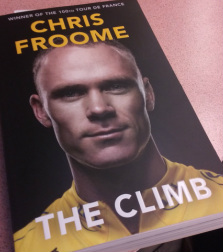 autobiography of Chris Froome autobiography of Chris Froome July 16, 2014 As I returned from England yesterday I lingered at a bookshop at the airport, as I usually do, and my eye fell on Chris Froome’s biography, "The Climb". I realised only a couple of days ago that he fell in the tour and was forced to give up with a broken wrist. Of course to great disappointment of himself, his crew and many of his supporters, if not all tour-lovers. I remember his story of the 100th Tour de France, last year’s, and how he became second, after Wiggins, during the 99th Tour. He should have finished first, based on his performance, but Wiggins was destined to win and so Froome ended second. Sometimes the real champions do not become champion (unfortunately there is no World Cup every year). Tendering for proposals can easily be compared to riding a Tour. First of all, you need to bring a good team together with people who have trained together, who trust each other and will support one another, under any circumstances. Secondly, you need to study the landscape and the competition: Who else is in the course? What does the landscape look like? Where do we need to finish? And then you have to worry about the mountain ahead of you. Once you are over the top you go down in dazzling speed. Braking may be deadly, but you still have to control your speed. On one occasion young boy Chris had taken off his helmet while descending from the Ngong hills with David Kinjah, his Kenyan rolemodel. He had clipped it onto his handle bars. After a pothole in the road it plunged into the front wheel of the 'Black Lion', which was David’s nickname in Italy. David was launched from his bike and ended on his knees and elbows a few yards down the road. At first they waited for a car to come by, but finally David picked himself together and got back on his bike to find the nearest health post and insisted to cycle home with Froome rather than using the car of Froome’s mother. The next day both of them were back on the road. What struck me in Froome’s biography was his perseverance which gave him the drive to excel in his sport, which he had learned from a Kenyan cyclist David Kinjah. While training in the Ngong Hills, chasing the 'Black Lion' on a slope down-hill he learned to be second. A lesson he needed that day in Paris with Wiggins. This story seems romantic with a lot of out-of-Africa, but soon you realise that for Froome, fate makes a strange twist as his father’s tour business goes bankrupt and his mum and dad get into a divorce. Froome changed places many times, which prepared him for being the global nomad he now has become having won the Tour last year. If there is one thing he learned in Africa, it is: champions may fall easily. The questions is not: have you been the fastest? The question is: do you get back on your feet when you fall? And if you fail, you just wait for the next opportunity to arise. Again his fate took a bad twist. Hopefully, it will lead him to other unexpected heights. "The reason we demand accountability is because there is no trust. There is a general lack of trust. You cannot buy trust. Neither can you successfully impose it. So in order to get accountability, to get trust, you need to foster 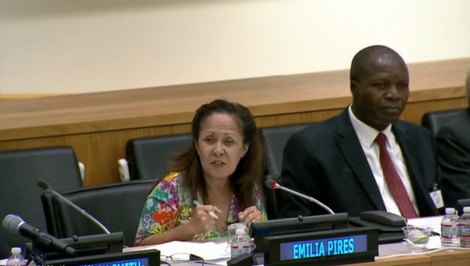 Emilia Peres: "The MDGs were about us, so we should run the secretariat, not the UN" Emilia Peres: "The MDGs were about us, so we should run the secretariat, not the UN" New York, July 12, 2014 Yesterday the two weeks of high-level getting together came to a close. The internet and live coverage made it possible to follow even all sessions that were planned simultaneously. At one time I found myself interacting with two sessions simultaneously using twitter ((#HPLF and #DCF) and two screens. The side-meetings on Disaster Risk Reduction and Open Data that both captured my attention. Another side-meeting, that was not broadcasted for some reason, was the lunch-meeting where the Netherlands and Mexico as co-chairs of the Global Partnership for Effective Development Cooperation (GPEDC) presented their key-messages to the DCF. Anyhow, their message also featured at session 5 of the Development Coopration Forum about accountability entitled: "Ensuring the quality and effectiveness of development cooperation." This session was moderated by Mr. Danny Sriskanderajah, Secretary-General of CIVICUS and reported on in this blog. DCF's 3rd Global Accountability Survey First Mr. Wu Hongbo, Under-Secretary-General for Economic and Social Affairs, was allowed to present the results of the DCF 3rd Global Accountability Survey, a follow-up from the High Level symposium in Vienna in 2009. The survey was used by GPEDC as a basis for measuring their indicators for accountability. Though at the time of writing of this blog I could not trace a digital version online, a draft of the same document had already been presented at a DCF high-level meeting in Germany earlier this year. This survey identified key-enablers for mutual accountability: 1. solidified trust between governments and their development partners 2. balance owners of monitoring and reporting to free up capacites in developing countries 3. make better use of cost-effective modalities of predictable funding with limited conditionalities Findings of the survey showed 'progress' with 46 out of 50 countries having development policies with locally driven monitoring and results frameworks scoring much better in aid delivery as a result. Lack of availability of useful information was seen as a major hurdle for effective accountability. Improved parlementary scrutinty of development policies is required. Key-messages from the GPEDC Secondly the GPEDC was allowed to share their perspective on accountability. Mr. Juan Manuel Valle Perena of the Mexican Agency of International Devleopment delivered the key-messages from the GPEDC. "We have a more flexible and informal setting at the GPEDC. The possibility to have actors that might not be here is also helpful." The latter was a clear reference to the possibility to invite multinationals to the forum having their say in world affairs. Mr. Juan stated that "The core business of the partnership is to improve the quality of international cooperation, ensuring transparency and predictability and alignment with countries' priorities and that there is a planning and implementation of these priorities in a result oriented fashion and that we can properly measure the results we get." In terms of the relationship between GPEDC and DCF it was emphasized by GPEDC that their results based approach, inclusive dialogues and systemic gathering of evidence are complementary to the processes of DCF. Mr. Juan made reference to the ODA discourse and the financial logic stressing the need for alignment to what we want which is minimise the risks of our investments. Transparency and predictability and alignment with priorities of receipient countries is needed. Furthermore GPEDC wants to not only focus on LDCs but also include MDCs, acknowleding the flaws of GDP as indicator for development. The importance of mobilising resources improving taxation systems was emphasized. Furthermore southern expertise is to be valued better and cooperation with business partners as new partners in development is actively sought. Civil society perspectives The subsequent discussion brought some civil society perspectives to the forefront, clearly staged beforehand since the moderator knew name and affiliation of Codillia Lonsdale of Development Initiatives reflecting on the third question that was posed to the panel on how accountability mechanisms can incentivise positive behavioral change. According to Development Initiatives one way of achieving this goal is to harness the power of citizens participation and enhancing accountability providing feedback on public spending. She pointed to two practical ways of getting proper feedback that will drive change, based on experience in East-Africa and Nepal: 1) User friendly information about development projects has to get into the hands of sub-national decision-makers because that are well-placed to monitor impacts. Development actors should produce timely and forward looking data in a machine readable format that can be accessed and used by these stakeholders. 2) We cannot practically seek feedback without investing in statistical capacity at all levels. John Synclair from the North-South institute in Canada also emphasized the need for accountability getting to the poor themselves. How to engage the people that we are targeting with all these efforts displayed these days between DCF and GPEDC and the like. Northern perspective Anthony Smith of DFID brought forward the accountability mechanisms used in the UK. He pointed to the need to be accountable to tax payers in the UK in terms of why the budget for ODA was made available: for poverty reduction and humanitarian aid. He dwelled on the importance to have the knowledge industry on board in evaluating the impact of development efforts spending 3% of the budget (300 million pound) on assessments, evaluations and research and transparency about the knowledge that has been generated. He also pointed to competing interest and admitted that coherence is something the UK has great difficulty to live up to. What helps is being transparent about the trade-offs and have a seperate development Minister which is represented at the National Security Council level. When it comes to accountability mechanisms the sticks are needed more at national level and carrots at international level, displayed by the multitude of voluntary initiatives. Southern perspectives Toikeusse Albert Mabri from Ivory Coast, agreed with the need for better statistics and the like and made reference to governance reforms already made by countries like Ivory Coast, Marocco and Rwanda leading to bette results. However, he also stated that donors must keep their promises and deliver on capacities for having better statistics at national and regional levels to enable governments to be assessed by internally and externally on development results. Emilia Pires from East Timor was asked to share the experience of South-South cooperation.In an emotional contribution she pointed to the core of the problem being discussed. Coming in as new Minister of Finance with her Australian educaton she was trying to reform it. Asking for the one who manages the contracts she was referred to a low-raking officer copying the contracts and filing them. This to her resembles the way many countries were managing their contracts also in the context of the MDGs. "We should go through these 'contracts' together. We should understand what the MDGs are. I had arguments with the UN. The secretariat of the MDGs should be with me not with them. Because it is about me. This changed our behavior, making me more responsible for it, since it was about us." First reaction to failing is often penalizing she continued. However, first we need to know if enough resources are available to deliver. "Everybody was to support East Timor. Nobody wanted to invest in the hardware. I had to fight International NGOs as we did not even have a chair and table or a car to go from A to B. Everybody wanted to invest in the soft stuff." She suggested the audience to change shoes. "I was working for the WorldBank and the UN. Than I became Minister of Finance. Than I understood how people were thinking. Do you trust me? Everybody wants to succeed, so depart from that point." She made reference to the example of Guinee Bissau where all donor countries sanctioned it telling Guinee Bissau they first needed to organize a legitimate government. But how to organize elections without resources? They came out to East Timor and received a helping hand. "We had to buy the stuff from countries that were boycotting Guinee Bissau. Now that an elected government is in place everybody wants to associate with it. That is what is wrong with the international community. We have lost the compassionate sense of human being. We just have to go back to the basics." Local perspectives Mrs. Nowveliso Nyukwana from South-Africa brought the perspective of the local government. "If you want to be sure that there is effectiveness that is measured if we recognize the role of local government. Because the people, civil society, businesses are there in the local space. From the local space upward. I am saying this with the experience I have from the local government. Peer-to-peer capacity building between South-african and Netherlands municipalities were brought to the forefront. The partnership and agenda is informed by local challenges, which in our case is unemployment. The relationship should be based on long-term partnership. Take the example of decentralisation. The local government is already knowledgable and has a broad range of succesful approaches." Parliaments Mr. Felix Mutati from Zambia gave a strong statement about one of the major preconditions for accountability. "Accountability must be centred on the people, their needs, their anxieties and their hopes. It must secure and be used as an instrument of promoting trust between the state and its people. You must start at the national level, clearly defining the responsiblity an dreinformecemnt mechangisms. From the parliamentarian perspective, The lack of independency of the spring audit compromises the effectiveness of accountability. We rely on the reports given to us by the Auditor Generals. Secondly, most support goes through the budget, direct budget report. Translating those agreements and an assessment mechanisms in order to hold governments squarely accountable is lacking. We have also seen the imposement side of accountability. It is on how do you ensure that you enforce accountability if you cannot respect the auditor report, if you are lacking information." The role of supreme audit institutions was also emphasized by an Austrian parlementarian. Concluding Mr. Danny Sriskanderajah once again emphasized the importance of accountablity for public confidence and faith.The holistic nature of what we are talking about, you cannot buy and impose trust. We need accountability mechansims that are positive. On top of that better information and data is needed. All-in-all it was the most interesting session where southern countries really challenged many northern development providers on their level of engagement, echoing the words of Robert Chambers with whom the first day of the Development Cooperation Forum was opened: The language dramatically changed over the years. Participation, relationship, power dynamics, complexity and the like have been exchanged for partnership, results-based-management and accountability. The soul seems to be out of the matter with agencies living of poverty and competing with each other for scarce resources. Hope the SDGs will be tangible goals that will be delivered on. The zero-draft has little to offer in that respect, despite the open working group wanting a transparent and inclusive process. Few agencies and member states have warmheartedly embraced the draft SDGs. I guess Mr. Sajdik has some homework.
Representing a planned economy model it won't be a surprise that planning was a key-word. Mr. Li Pengde quoted his minister Wang LI who had already shared the existence of major challenges with the pollution of air, water and soils in China bringing sustainable development to the core of policy development in China. It was recognized that the UN data includes a large quantity of maps, but many were found out of date. Hence China's gift to the world through the UN, the GlobalLand 30 map, that offers geospatial information on 30x30 meter resolution. China wants to 1) favour ecological progress over development progress which will need 2) a favourable policy environment expressed in 3) common but differentiated responsibilities with 4) due attention to social issues while 5) investing in innovation of thinking, models and methods. This summarizes China's 5 pillars for sustainable development. These pillars were already presented by Mr. Wang Li at the first HLPF "The key is to respect the law of nature, follow nature's will, and foster a sound interaction between economic growth, social progress and environmental protection." It is important to note the notion of ecological civilization that China aims at. It starts with natural resource capitalization. That China sees natural resource as 'capital' has already been demonstrated by its heavy investement in African economies that have abundant natural resources. In the absence of a global legal framework, the local political reality is taken as a given. However, also China realises that this carries a number of risks that could be averted by better legal systems that lead to improved governance and proper accounting, not unimportant for a planned economy. In this context it will be good to follow closely what the UN-China Trust Fund is aiming for. At the first HLPF already Minister Wang Li himself pledged massive support to Small Island Countries and least developed countries, including a grant of US$ 500.000 towards the organization of the Third International Conference on Sustainable Development of Small Island Developing States to be organized in Samoa this year and already frequently referenced by the President of ECOSOC and also featuring prominently on the agenda of the HLPF. China's priorities cannot be ingored and for China the Small Island Developing States are the nearest bridge towards the developing world. 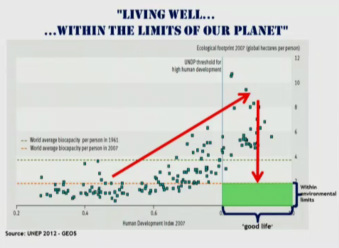 On of the slides presented by the EU commissioner On of the slides presented by the EU commissioner The past week was the first leg of a two week gathering of the High Level Policy Forum on Sustainable Development, that was established to make up for the Rio+20 failure last year. Under auspices of ECOSOC the forum (implementation of resolution 67/290) is to serve as a space where decision-makers could reflect on the results of another process that has been going on for some time now, delivering a post 2015 framework for sustainable development, replacing the current MDG framework that will only last till the end of 2015. A zero draft was on the table but not very much subject of discussion since the Open Working Group process, involving all stakeholders, has not been finalised yet. The second week will accomodate the Annual Ministerial Review of ECOSOC as well as the Development Cooperation Forum. Click here for the more details and an integrated program. Much appreciation of the joint effort of the past week was expressed by ambassador Martin Sajdik (Austria), currently president of ECOSOC opening the ministerial dialogue today. As a typical example of a UN bureaucrat he repeatedly stated that the post 2015 agenda should not carry a 'gloom and doom' but a 'Yes we can' message that should revamp development. I am not sure if he was addressing the right audience given the many empty seats at the start of the gathering. Agenda The science-policy interface received speciifc reference during the past week, emphasizing the need for science to contribute to evidence based policy making with the Global Sustainable Development Report as most important vehicle. Other topics of the agenda were the Sustainable Production and Consumption ten year program (10YSCP), which was an outcome of Rio+20 within the mandate of UNEP. It gained momentum but was told to get to the implementation phase and deliver on its mandate. Finally countries in special situations including small islands were given specific attention at the occasion of International Year of Small Island Developing States. An upcoming conference in Samoa was brought to the attention of the audience and also reference was made to the development of a vulnerability index to address climate change and extreme wheather events affecting these states. Finally the means to walk the talk was subject of discussion with the ever growing role of business, private capital flows and even capitalization of the natural resource base mentioned. New forms of development financing are required, including south-south cooperation and regional approaches. Good governance, rule-of-law, women empowerment, partnership with the business sector, economic stability and decentralisation were seen as essential for building resilience. They will most probably feature at the Addis Ababa finance for development conference in July 2015. Finally the role of the High-level Policy Forum itself was elaborated, including its role in the voluntary review of SDG achievement at country level, once the SDGs are finalized. Disappointment Some level of disappointment with the zero-draft produced by the Open Working Group was expressed today by Mr.Sajdik, president of ECOSOC, at the start of the Ministerial gathering. While launching the MDG 2014 annual report today, the UN Secretary-General Ban Ki Moon indicated that social exclusion and discrimination have been amongst the most important obstacles for achieving the MDGs, hinting that due attention is to be paid to these realities while formulating the SDGs. In the deliberations that followed repeatedly middle-income countries and China (77+China) emphasized the differentiated commitments on the SDGs (Rio principle 7 also featuring at the Rio+20 gathering). It seems that the post 2015 framework is still dominated by the reality of developed economies, just trying to recover from the financial crisis, seeing chances for greening the global economy and making good money out of it. The genuine intentions may be questioned as basically western countries are facing a situation of a dwindling global resource base that no longer supports consumption patterns of their knowledge economies. The many empty seats from developing nations representatives at the HLPF tells the story about who is setting the agenda. In the Annual Ministerial Review meeting of ECOSOC next door the 77+China and the European states seemed to form two blocks with each their own perspective on sustainable development as to who should do it and who should pay for it. To be continued.... |
About meMy name is Reinier van Hoffen. U®Reading
Click here for a summary.
Also find the text of a lecture Dr. Achterhuis held at the 2012 Bilderberg conference. Archives
August 2022
|
AddressNachtegaallaan 26
Ede, the Netherlands |
Telephone+31 (0)6 1429 1569
|
info@uraide.nl
|
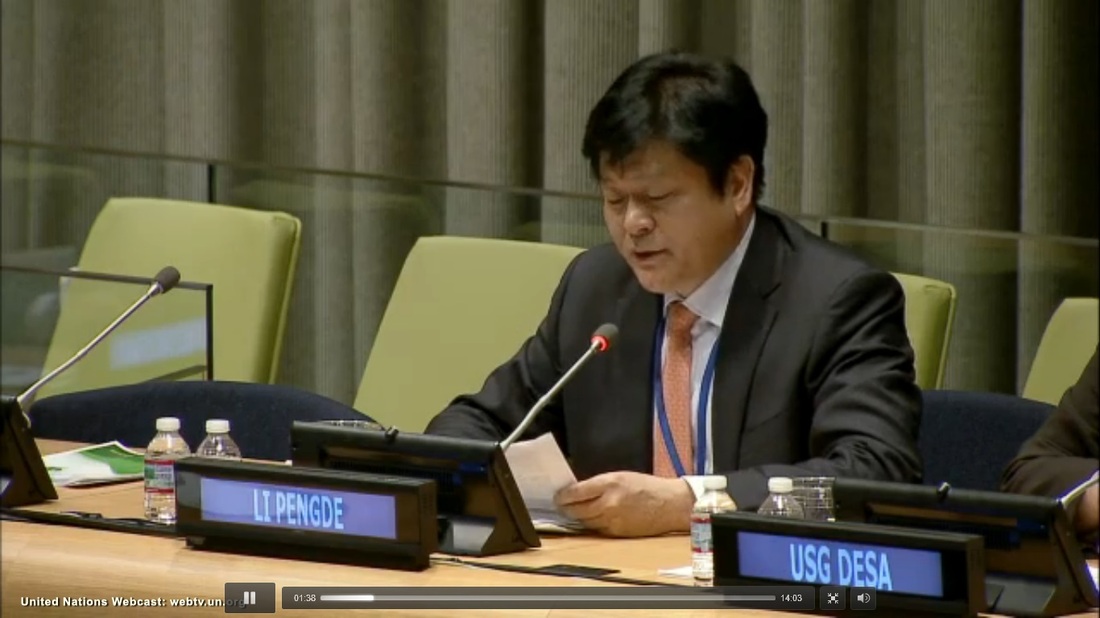
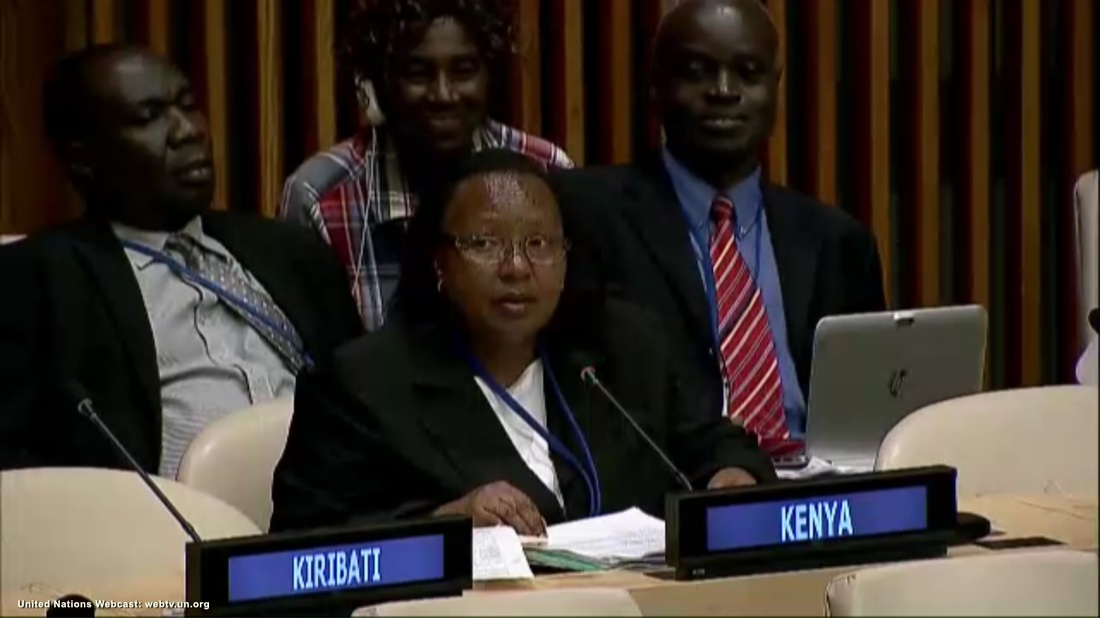
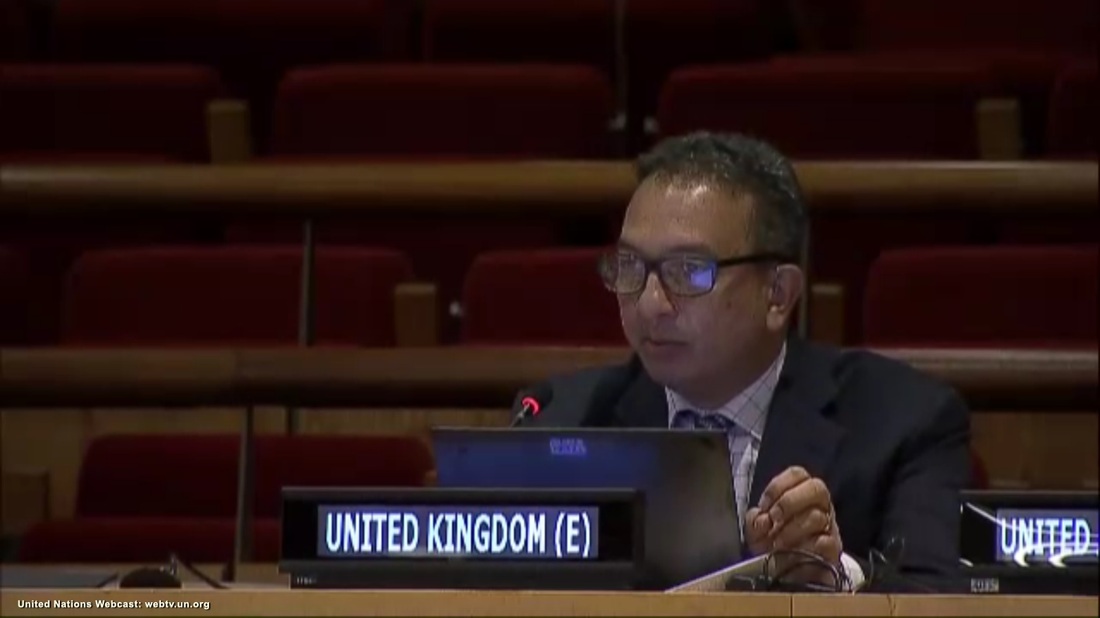

 RSS Feed
RSS Feed
















